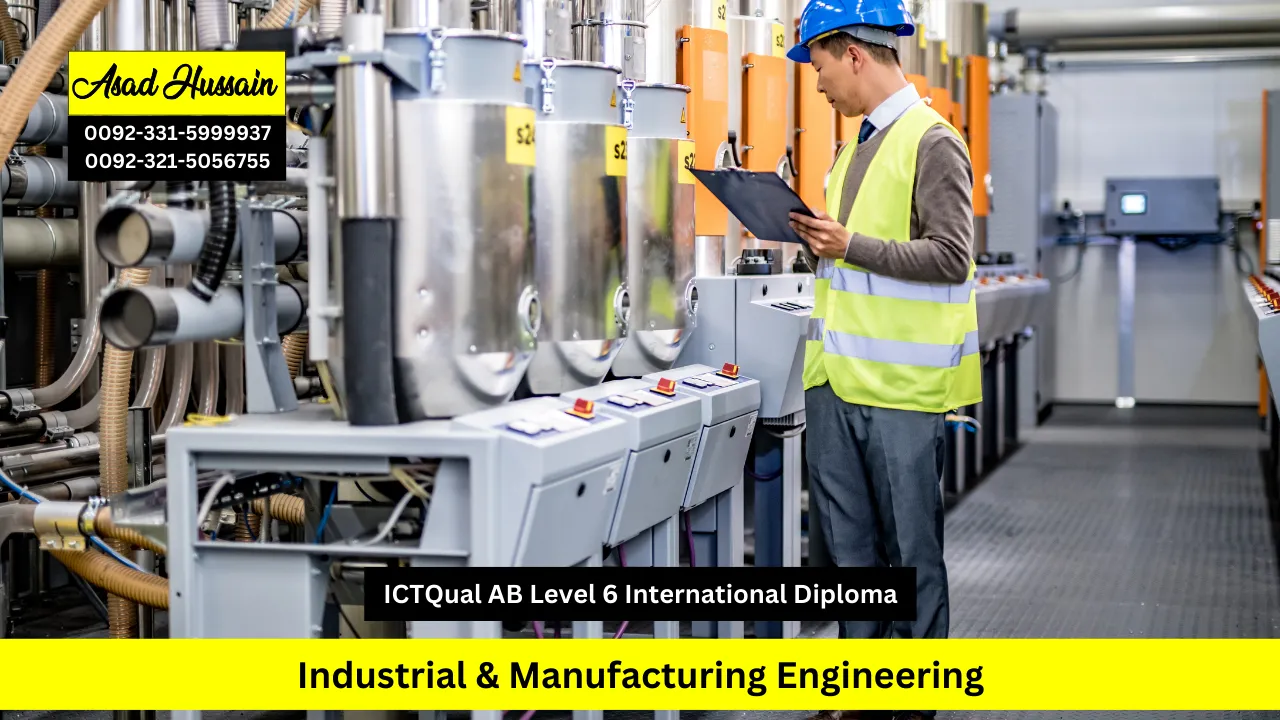The ICTQual AB Level 6 International Diploma in Industrial & Manufacturing Engineering is a globally recognized qualification designed to equip learners with advanced knowledge and practical skills in modern industrial and manufacturing systems. In today’s fast-paced and technology-driven world, efficient production processes, innovative manufacturing techniques, and optimized industrial operations are critical for organizational success and competitiveness. This course provides a comprehensive foundation in these areas, making it highly relevant for both freshers and experienced professionals seeking to excel in the manufacturing sector.
The purpose of ICTQual AB Level 6 International Diploma in Industrial & Manufacturing Engineering is to develop highly skilled professionals capable of managing, designing, and improving complex manufacturing systems. Learners will gain expertise in production planning, quality control, process optimization, industrial automation, and supply chain integration, ensuring they are equipped to tackle the challenges of modern industry. The curriculum also emphasizes safety, sustainability, and innovative problem-solving approaches, enabling learners to contribute to both operational efficiency and strategic decision-making.
Throughout the ICTQual AB Level 6 International Diploma in Industrial & Manufacturing Engineering, learners will engage with 360 credits worth of intensive study, combining theoretical understanding with hands-on practical applications. By the end of ICTQual AB Level 6 International Diploma in Industrial & Manufacturing Engineering, graduates will have mastered essential skills in manufacturing technologies, industrial engineering methods, project management, and research-based problem solving. These competencies prepare learners for leadership roles in production management, process engineering, quality assurance, and industrial innovation, or for further advanced studies in engineering and technology.
ICTQual AB Level 6 International Diploma in Industrial & Manufacturing Engineering offers a robust platform for individuals aspiring to make a tangible impact in the industrial and manufacturing sectors, positioning them as valuable assets in a competitive global market. It is ideal for those committed to driving efficiency, innovation, and sustainable growth in modern manufacturing environments.
Program Highlights
Study Units
This qualification, the ICTQual AB Level 6 International Diploma in Industrial & Manufacturing Engineering, consists of 36 mandatory units.
Year 1 – Foundation in Industrial & Manufacturing Engineering
- Principles of Industrial and Manufacturing Engineering
- Engineering Mathematics
- Fundamentals of Mechanical and Electrical Engineering
- Materials Science and Engineering
- Engineering Drawing and CAD
- Introduction to Manufacturing Processes
- Basics of Automation and Control Systems
- Production Planning and Operations Management
- Quality Fundamentals and Inspection Techniques
- Health, Safety, and Environmental Practices in Engineering
- Communication and Technical Report Writing
- Introduction to Project Management in Engineering
Year 2 – Intermediate Studies in Industrial & Manufacturing Engineering
- Manufacturing Systems and Technology
- Advanced Production Planning and Scheduling
- Lean Manufacturing and Continuous Improvement
- Industrial Automation and PLC Programming
- Supply Chain and Logistics Management
- Mechanical Design and Manufacturing Processes
- Industrial Maintenance and Reliability Engineering
- Computer-Aided Manufacturing (CAM)
- Data Acquisition and Process Monitoring
- Sustainable Manufacturing and Green Engineering
- Applied Research Methods in Engineering
- Human Factors and Ergonomics in Manufacturing
Year 3 – Advanced Studies in Industrial & Manufacturing Engineering
- Smart Manufacturing and Industry 4.0
- Advanced Manufacturing Technologies (Additive, CNC, etc.)
- Robotics and Autonomous Systems in Manufacturing
- Advanced Quality Management and Six Sigma
- Cyber-Physical Systems and IoT in Manufacturing
- Supply Chain Optimisation and Global Operations
- Advanced Process Engineering and Simulation
- Innovation and Product Development in Engineering
- Professional Ethics and Sustainability in Manufacturing
- Technology Entrepreneurship and Business Development
- Infrastructure and Facility Planning for Manufacturing Systems
- Final Year Major Project (Capstone Project)
To ensure learners are fully prepared for the rigorous study and practical applications of this program, it is essential to meet the entry requirements outlined below. These prerequisites help candidates gain the maximum benefit from the course and succeed in industrial and manufacturing engineering roles.
Age Requirements
- Learners must be at least 18 years old at the time of enrolment.
- Mature learners with relevant experience may also be considered on a case-by-case basis.
Educational Requirements
- A minimum of a Level 5 qualification in Engineering, Manufacturing, or a related field.
- High school graduates with strong mathematics and science background may be eligible for assessment-based entry.
- Completion of a foundation or diploma course in Industrial or Mechanical Engineering is an advantage.
Professional Experience
- Experienced professionals with at least 6 years of verifiable work experience in manufacturing, production, or industrial operations may qualify for direct entry.
- Practical exposure to production processes, quality management, or industrial systems will enhance understanding of course content.
English Language Proficiency
- Learners must demonstrate proficiency in English to understand course materials and assessments.
- IELTS 5.5 or equivalent is recommended for non-native English speakers.
Meeting these entry requirements ensures learners are well-prepared to engage fully with the ICTQual AB Level 6 International Diploma in Industrial & Manufacturing Engineering. Proper adherence to these prerequisites enables candidates to successfully complete the program and advance their careers in industrial and manufacturing engineering.
The ICTQual AB Level 6 International Diploma in Industrial & Manufacturing Engineering equips learners with advanced knowledge, technical expertise, and practical skills essential for excelling in industrial, manufacturing, and production environments. Upon completing ICTQual AB Level 6 International Diploma in Industrial & Manufacturing Engineering, learners will be able to manage complex engineering projects, implement innovative manufacturing solutions, and contribute to organizational efficiency and growth.
Year 1 – Foundation in Industrial & Manufacturing Engineering
Principles of Industrial and Manufacturing Engineering
- Understand fundamental principles of industrial and manufacturing engineering.
- Apply theoretical concepts to practical production scenarios.
- Evaluate efficiency and effectiveness of manufacturing systems.
Engineering Mathematics
- Solve complex engineering problems using advanced mathematical techniques.
- Apply statistical and numerical methods in manufacturing contexts.
- Utilize mathematical models for production planning and quality control.
Fundamentals of Mechanical and Electrical Engineering
- Demonstrate understanding of core mechanical and electrical engineering concepts.
- Apply knowledge to analyze and solve engineering problems.
- Integrate mechanical and electrical principles in manufacturing processes.
Materials Science and Engineering
- Identify and classify engineering materials based on properties and applications.
- Analyze material behavior under different mechanical and thermal conditions.
- Select suitable materials for manufacturing and production processes.
Engineering Drawing and CAD
- Produce accurate technical drawings using CAD software.
- Interpret engineering drawings for design and production purposes.
- Develop 3D models for manufacturing applications.
Introduction to Manufacturing Processes
- Describe key manufacturing processes and techniques.
- Apply process knowledge to optimize production operations.
- Evaluate process efficiency and material utilization.
Basics of Automation and Control Systems
- Understand fundamentals of industrial automation and control.
- Apply basic control system concepts to manufacturing applications.
- Implement simple automation solutions for production tasks.
Production Planning and Operations Management
- Plan and schedule manufacturing operations efficiently.
- Apply operations management principles to enhance productivity.
- Monitor production processes to ensure optimal performance.
Quality Fundamentals and Inspection Techniques
- Understand principles of quality management in manufacturing.
- Apply inspection techniques to monitor product quality.
- Implement basic quality control measures in production processes.
Health, Safety, and Environmental Practices in Engineering
- Recognize workplace hazards and implement safety protocols.
- Apply environmental standards in manufacturing operations.
- Promote sustainable and safe engineering practices.
Communication and Technical Report Writing
- Develop effective technical documentation and reports.
- Communicate engineering concepts clearly to stakeholders.
- Present findings and project outcomes professionally.
Introduction to Project Management in Engineering
- Understand fundamentals of project management in industrial contexts.
- Plan, execute, and monitor engineering projects effectively.
- Apply project management tools to meet objectives and deadlines.
Year 2 – Intermediate Studies in Industrial & Manufacturing Engineering
Manufacturing Systems and Technology
- Analyze different manufacturing systems and technologies.
- Integrate technology to improve production efficiency.
- Evaluate system performance for continuous improvement.
Advanced Production Planning and Scheduling
- Apply advanced techniques in production planning.
- Optimize scheduling to maximize resource utilization.
- Monitor production workflow to meet deadlines and quality standards.
Lean Manufacturing and Continuous Improvement
- Implement lean principles to reduce waste and improve efficiency.
- Apply continuous improvement methodologies in production processes.
- Evaluate process improvements for measurable benefits.
Industrial Automation and PLC Programming
- Develop basic PLC programs for automation tasks.
- Integrate automation systems into manufacturing operations.
- Troubleshoot and maintain automated production lines.
Supply Chain and Logistics Management
- Understand supply chain fundamentals and logistics operations.
- Optimize inventory and material flow in production systems.
- Apply strategies to enhance supply chain efficiency.
Mechanical Design and Manufacturing Processes
- Design mechanical components for manufacturing applications.
- Evaluate design feasibility and manufacturability.
- Apply design principles to improve product performance.
Industrial Maintenance and Reliability Engineering
- Develop maintenance strategies to enhance equipment reliability.
- Implement preventive and predictive maintenance programs.
- Monitor system performance to minimize downtime.
Computer-Aided Manufacturing (CAM)
- Utilize CAM software to simulate manufacturing processes.
- Program CNC machines for precision production.
- Integrate CAM outputs into production planning.
Data Acquisition and Process Monitoring
- Collect and analyze production data for decision-making.
- Monitor process performance using real-time metrics.
- Apply data-driven insights to optimize operations.
Sustainable Manufacturing and Green Engineering
- Implement sustainable manufacturing practices.
- Reduce environmental impact through efficient resource use.
- Promote eco-friendly processes in industrial operations.
Applied Research Methods in Engineering
- Conduct research to solve practical engineering problems.
- Analyze data using statistical and engineering methods.
- Present research findings in a professional format.
Human Factors and Ergonomics in Manufacturing
- Understand ergonomic principles in industrial settings.
- Design workstations for efficiency and worker safety.
- Apply human factors to improve productivity and reduce errors.
Year 3 – Advanced Studies in Industrial & Manufacturing Engineering
Smart Manufacturing and Industry 4.0
- Implement Industry 4.0 concepts in manufacturing operations.
- Integrate IoT and digital technologies for smart production.
- Analyze data from connected systems to improve efficiency.
Advanced Manufacturing Technologies (Additive, CNC, etc.)
- Apply advanced manufacturing technologies in production.
- Evaluate feasibility of using additive and CNC techniques.
- Integrate technology to improve product quality and speed.
Robotics and Autonomous Systems in Manufacturing
- Design and implement robotic solutions for production lines.
- Program autonomous systems to perform manufacturing tasks.
- Evaluate robotic systems for safety and efficiency.
Advanced Quality Management and Six Sigma
- Apply Six Sigma methodologies to reduce defects.
- Implement advanced quality management systems.
- Monitor performance to maintain high standards.
Cyber-Physical Systems and IoT in Manufacturing
- Integrate cyber-physical systems into industrial operations.
- Use IoT devices for real-time monitoring and control.
- Analyze system performance to optimize production.
Supply Chain Optimisation and Global Operations
- Apply strategies for global supply chain efficiency.
- Optimize logistics and inventory management.
- Monitor performance indicators across international operations.
Advanced Process Engineering and Simulation
- Use simulation tools for process optimization.
- Model complex production systems for analysis.
- Implement engineering solutions based on simulation results.
Innovation and Product Development in Engineering
- Develop innovative products from concept to prototype.
- Apply engineering principles to improve design efficiency.
- Integrate market and technical research into product development.
Professional Ethics and Sustainability in Manufacturing
- Demonstrate ethical decision-making in industrial operations.
- Implement sustainable practices in manufacturing systems.
- Promote corporate social responsibility in engineering projects.
Technology Entrepreneurship and Business Development
- Develop business plans for manufacturing ventures.
- Apply entrepreneurial skills to industrial technology projects.
- Assess financial and operational feasibility for startups.
Infrastructure and Facility Planning for Manufacturing Systems
- Design manufacturing layouts for optimal workflow.
- Plan facilities for safety, efficiency, and scalability.
- Evaluate infrastructure for capacity and performance.
Final Year Major Project (Capstone Project)
- Conduct a comprehensive engineering project integrating learned concepts.
- Apply practical skills to solve real-world industrial problems.
- Present findings and solutions professionally to stakeholders.
Upon completing the ICTQual AB Level 6 International Diploma in Industrial & Manufacturing Engineering, learners will have developed advanced technical knowledge, practical skills, and professional competencies necessary to lead, innovate, and excel in global industrial and manufacturing sectors.
The ICTQual AB Level 6 International Diploma in Industrial & Manufacturing Engineering is designed for individuals who are motivated to develop advanced technical, managerial, and practical skills in industrial and manufacturing settings. Ideal learners are committed to excelling in engineering, production, and industrial operations.
Aspiring Industrial Engineers
- Interested in developing expertise in manufacturing systems and industrial processes
- Motivated to improve operational efficiency and productivity
- Eager to apply theoretical knowledge to practical engineering solutions
Professionals Seeking Career Advancement
- Currently working in manufacturing, production, or industrial sectors
- Looking to gain leadership and managerial skills in industrial engineering
- Interested in advancing to supervisory or strategic roles within organizations
Innovators and Entrepreneurs
- Motivated to design and implement innovative manufacturing solutions
- Interested in technology entrepreneurship and industrial product development
- Keen to explore Industry 4.0, automation, and smart manufacturing technologies
Lifelong Learners and Researchers
- Committed to continuous professional development in engineering and manufacturing
- Interested in applied research, data analysis, and evidence-based industrial practices
- Motivated to explore sustainable and ethical practices in industrial operations
Global Career-Oriented Professionals
- Looking to work in international manufacturing, industrial, or engineering environments
- Interested in understanding global supply chains, logistics, and production strategies
- Prepared to adapt to evolving industry standards and emerging technologies
This program prepares learners to become highly skilled, innovative, and globally competitive professionals in the industrial and manufacturing engineering sectors. Graduates will gain the technical expertise, practical experience, and strategic insight necessary to excel in complex industrial environments, lead manufacturing operations, and drive process improvements.
As an approved centre of ICTQual AB, learners must enrol with us to pursue the ICTQual AB Level 6 International Diploma in Industrial & Manufacturing Engineering. There are two certification routes depending on the learner’s experience
Route for Experienced Professionals
- Provide proof of at least 6 years of verifiable professional experience
- Certain assignments may be waived based on prior experience
- Complete the relevant assessments and assignments as determined by ICTQual AB
- Receive guidance and support throughout the certification process
- Successfully demonstrate knowledge and practical skills through assessments
- On completion, receive the ICTQual AB Level 6 International Diploma in Industrial & Manufacturing Engineering
Route for Fresh Candidates
- Complete all 36 assignments included in the programme
- Receive continuous assessment and constructive feedback
- Gain practical and theoretical knowledge in Industrial & Manufacturing Engineering
- Demonstrate skills and understanding through assignments and assessments
- Participate in guided learning and support throughout the programme
- On successful completion, receive the ICTQual AB Level 6 International Diploma in Industrial & Manufacturing Engineering
Both routes ensure that learners not only receive a globally recognized certification from ICTQual AB but also acquire a comprehensive set of practical, technical, and managerial skills essential for success in Industrial & Manufacturing Engineering. Learners will develop expertise in process optimization, production management, quality control, and advanced manufacturing technologies, enabling them to take on challenging roles in industrial operations, production planning, and engineering management.







